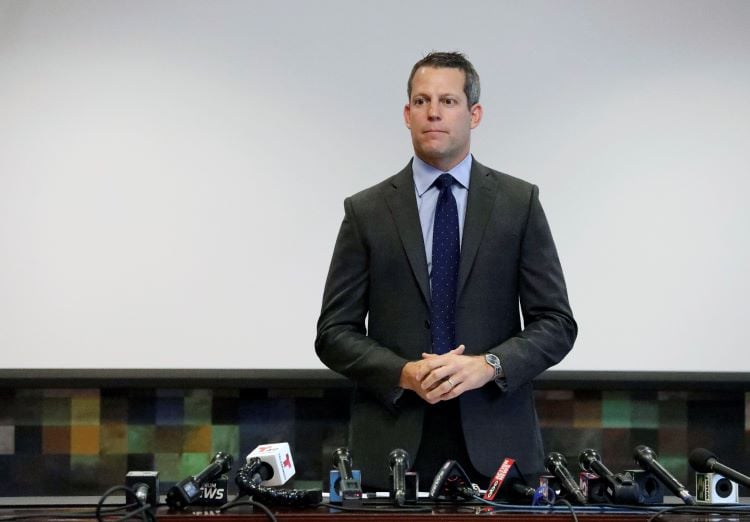DeSantis violated Florida Constitution by suspending prosecutor, but federal court can’t act, judge says

State Attorney Andrew Warren attends a press conference hours after Republican Florida Gov. Ron DeSantis suspended him because of neglect of duty Aug. 4, 2022, in Tampa, Florida. Photo by Douglas R. Clifford/The Tampa Bay Times via the Associated Press.
A federal judge in Florida has ruled that the 11th Amendment prevents him from ordering the reinstatement of a reform prosecutor suspended by Republican Florida Gov. Ron DeSantis.
U.S. District Judge Robert L. Hinkle of the Northern District of Florida said DeSantis was motivated mostly by two factors when he suspended State Attorney Andrew Warren of the 13th Judicial Circuit in Hillsborough County, Florida. DeSantis hoped to benefit politically, and he wanted to bring down a reform-minded prosecutor, said Hinkle in his Jan. 20 order.
Suspending Warren based on those factors violated the Florida Constitution, Hinkle said. But Hinkle said he lacked authority to issue an injunction based on a violation of only Florida law.
DeSantis had said he was acting under a state constitutional provision that allows the suspension of prosecutors for “neglect of duty” when he suspended Warrant without pay in August 2022. And he didn’t specifically cite either of the two factors that Hinkle deemed to be crucial to DeSantis’ decision.
DeSantis said he was objecting to Warren’s decision to sign two joint statements issued by Fair and Just Prosecution, a group that focuses on organizing, training and promoting elected prosecutors. One criticized bills that criminalize medical treatments for transgender people. The other statement pledged to “exercise our well-settled discretion and refrain from prosecuting those who seek, provide or support abortions.”
Warren later said in a television interview he would exercise discretion on whether to prosecute abortion cases, and he would follow court decisions on Florida’s 15-week abortion ban, Hinkle said.
DeSantis also criticized Warren for a policy against the prosecution of crimes involving bike-riding or pedestrian infractions and some misdemeanor crimes, such as resisting arrest without violence. But there was no blanket nonprosecution policy, Hinkle said. Both policies adopted a rebuttable presumption against prosecution, Hinkle said.
Hinkle said Warren’s political positions and office policies were indeed factors in DeSantis’ suspension decision, as were Warren’s Democratic political affiliation and his performance as a reform prosecutor. Firing someone for political positions in the Fair and Just Prosecution statements violates their First Amendment rights, as does consideration of Warren’s association with the Democratic Party, Hinkle said.
But DeSantis would have made the decision to suspend Warren, even if he hadn’t signed on to the Fair and Just Prosecution statements, Hinkle said. The First Amendment violations weren’t essential to DeSantis’ decision, and they don’t entitle Warren to a federal injunction.
“Warren was the leading Florida reform prosecutor,” Hinkle said. “The FJP statements were a way to justify a decision already in the works on other grounds.”
“In short, the controlling motivations for the suspension were the interest in bringing down a reform prosecutor—a prosecutor whose performance did not match the governor’s law-and-order agenda—and the political benefit that would result. The actual facts—whether Mr. Warren actually had any blanket nonprosecution policies—did not matter. All that was needed was a pretext to justify the suspension under the Florida Constitution.”
Hat tip to Law360, Reuters, ABC Action News and the New York Times, which had coverage of Hinkle’s decision.
See also:
ABAJournal.com: “Florida prosecutor sues governor over suspension, claiming free speech violations”
ABAJournal.com: “Weekly Briefs: Legal sector gains 34,700 jobs in a year; judge unseals Trump search warrant”
Write a letter to the editor, share a story tip or update, or report an error.



